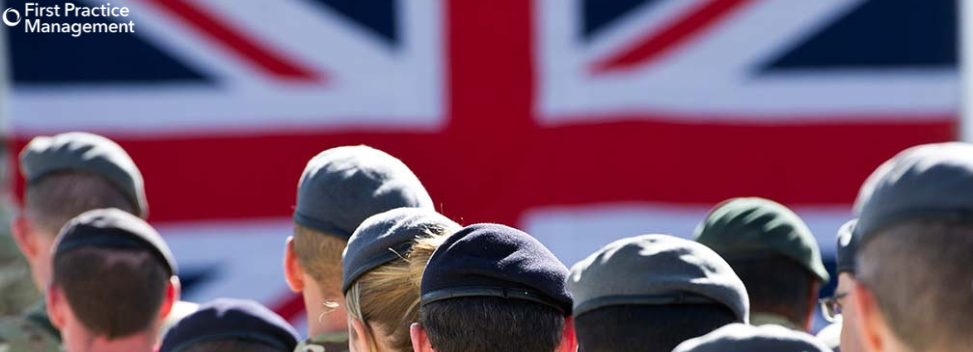
The UK has a proud history of military service, and veterans deserve the best possible healthcare after their time in the armed forces. But veterans can sometimes face challenges accessing appropriate primary care. In advance of this year’s Armed Forces Day on 29th June, this article provides GP Practice Managers with an overview of services available for veterans in the UK, highlighting the importance of veteran-friendly practices and resources for staff development.
Understanding Veterans' Needs
Veterans may have unique healthcare needs compared to the general population. They might have sustained physical injuries during service or suffer from mental health conditions like PTSD. But some veterans may hesitate to seek help due to the nature of their military training. A veteran-friendly GP practice fosters an environment where veterans feel comfortable discussing their health concerns.
Benefits of a Veteran-Friendly Practice
Becoming a Veteran Aware accredited practice demonstrates your commitment to supporting veterans and helps attract this patient group. Veteran Aware practices provide:
- Dedicated staff: A clinical lead with an understanding of veterans' specific needs.
- Accessible information: Resources on veteran-specific services displayed in waiting areas and on the practice website.
- Understanding staff: Training for staff on military culture and common veteran health concerns.
Priority Access and Dedicated NHS Services
While veterans don't receive priority for all NHS services, they do receive faster access for secondary care related to service-related conditions, provided their clinical need is comparable to other patients.
The NHS offers dedicated services for veterans;
Op COURAGE: Launched in April 2023, Op COURAGE is a comprehensive mental health service designed to support veterans, service leavers, and reservists, as well as their families, offering:
- Assessment and diagnosis: Op COURAGE can assess veterans' mental health needs and provide diagnoses for conditions like PTSD, anxiety, and depression.
- Treatment: The program offers a range of treatments, including individual therapy, group therapy, medication management, and support groups.
- Care coordination: Op COURAGE can help veterans navigate the healthcare system and ensure they receive the care they need, regardless of location. They can also liaise with other healthcare professionals involved in a veteran's care.
Op RESTORE: Established to address veterans' physical health needs, Op RESTORE provides specialist care and treatment for veterans with service-related injuries or health conditions. This program offers:
- Multidisciplinary care: Op RESTORE teams include doctors, nurses, physiotherapists, occupational therapists, and other specialists who work together to create a personalised treatment plan for each veteran.
- Treatment pathways: Depending on the veteran's specific needs, Op RESTORE can provide treatment through a variety of pathways, including outpatient clinics, inpatient rehabilitation, and specialist services.
- Rehabilitation: Op Restore focuses on helping veterans regain their physical function and independence after an injury or illness.
Additional Support for Veterans
Several organisations offer veterans additional support, including:
- The Royal British Legion: Provides financial assistance, welfare support, and advocacy
- Combat Stress: The leading mental health charity for veterans, offering specialised treatment and support
- Veterans' Mobility Fund: Offers financial assistance for mobility equipment for veterans with service-related disabilities.
The Importance of a Veteran Policy: Do You Have One?
Developing a clear policy for treating veterans helps ensure your staff has the information and knowledge to provide veterans with the best possible care. This policy should address:
- Identifying Veterans: Encourage veterans to disclose their military service during registration and consultations.
- Understanding Veteran Needs: Provide staff training on military culture, common veteran health concerns, and available services.
- Signposting Services: Ensure staff are aware of veteran-specific NHS services and relevant charities.
Military veterans have served their country, and they deserve our best efforts in supporting their healthcare needs. By becoming a veteran-friendly practice and ensuring staff are well-informed, you can play a vital role in helping veterans receive the care they deserve. This not only benefits veterans but also strengthens the communities they call home. With a little extra effort, your practice can make a significant difference in the lives of veterans.
More Information
- Email NHS England Armed Forces Team: england.armedforceshealth@nhs.net
- Royal College of General Practitioners (RCGP): Provides a Veterans Healthcare Toolkit for GPs
- Veterans Covenant Health Alliance (VCHA): Offers resources and support for healthcare providers working with veterans (the NHS Wales information can be found here)

0 Comments